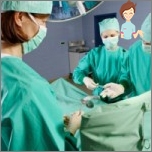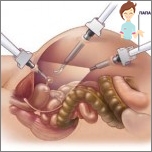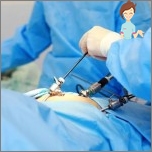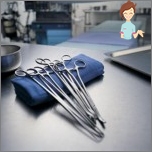Laparoscopy – What you need to know about the procedure?
Laparoscopy: Indications and Contraindications, Process Preparation, Conducting and Rehabilitation. Reviews and experience of real women. + Video on the topic.

The diagnostic type of laparoscopy is assigned in the case when the formulation of an accurate diagnosis of diseases in the field of pelvis or abdominal cavity is difficult. This is the most popular modern procedure for studying the abdominal cavity.
How laparoscopy is held?
-

The operation is carried out under general anesthesia using endotracheal anesthesia;
- A hole is made in the navel, the gas in the abdominal cavity is introduced through it;
- In the abdominal cavity there are several micro-cuts (usually two);
- Air is injected;
- Laparoscope is introduced through one incision (thin tube with an eyepiece at one end and lens, or a video camera – on the other);
- The manipulator is introduced through the second incision (for assistance in inspection and displacement of the organs).
Video: How is laparoscopy and what is «Room obstruction»
Indications for laparoscopy
-

Infertility;
- Impassability of uterine pipes (identification and liquidation);
- Ectopic pregnancy;
- Appendicitis;
- Moma, endometriosis, ovarian cysts;
- Inflammatory diseases of the internal genital organs;
- Heavy form of secondary dismenoria.
Contraindications for lapovaroscopy
Absolute
-

Diseases of the respiratory system in the decompensation stage;
- Cardiovascular diseases;
- Cachexia;
- Hernia diaphragm (or front abdominal wall);
- Comatose or shock states;
- Blood coagulation disorders;
- Acute infectious diseases;
- Bronchial asthma with exacerbations;
- Hypertension with high blood pressure values.
Relative
-

Malignant ovarian tumors;
- Cervical cancer;
- Obesity of the 3-4th degree;
- The essential dimensions of the pathological formations of internal genital organs;
- A pronounced adhesion process formed after surgery on the abdominal organs;
- Significant amount of blood in the abdominal cavity (from 1 to 2 liters).
What complications are possible after the procedure?
Complications for this procedure – a rare phenomenon.
What can they be?
-

Injuries of organs with the introduction of tools, chambers or anesthesia;
- Subcutaneous emphysema (the introduction of gas when the abdomen is inflated into the subcutaneous fat tissue);
- Injured large vessels and organs in the process of various manipulations in the abdominal cavity;
- Bleeding during the recovery period with an insufficient stop of bleeding during surgery.
Preparation for the operation

Before the planned operation, the patient must pass a certain number of different surveys. As a rule, they are held directly in the hospital, or the patient arrives at the department already with a full map of all necessary analyzes. In the second case, the number of days must be reduced in the hospital.
Approximate list of surveys and analyzes:
- Coaligram;
- Blood biochemistry (total protein, urea, bilirubin, sugar);
- General analysis of urine and blood;
- Blood type;
- HIV analysis;
- Analysis on syphilis;
- Analysis on hepatitis B and C;
- ECG;
- Fluorography;
- Smear from the vagina on the flora;
- Conclusion of the therapist;
- Ultrasound of a small pelvis.
With existing pathologies from any system of the body, the patient should be consulted by a specialist to assess the presence of contraindications and the development of tactics of reference to and after surgery.
Mandatory actions and guidelines to surgery:
-

Pregnancy protection in the cycle when the operation is performed, is carried out with the help of condoms;
- After the clarification of the doctor about the volume of operation and possible complications, the patient signed consent to the operation;
- Also, the patient gives his consent to anesthesia, after a conversation with an anesthesiologist and its explanations on drug preparation;
- Cleansing the gastrointestinal tract is carried out before the operation must, to open access to organs and better review;
- On the eve of the operation, you can only eat up to six o’clock in the evening, after ten in the evening – only water;
- On the day of operation, the adoption of drinks and food is prohibited;
- The hair of the perineum and the bottom of the belly before the operation is drunk;
- If there is a testimony, then before the operation (and during the week after), the patient should carry out elastic binting of the legs, or to wear antibarotic stockings, in order to avoid possible blood clots and their injuries to the bloodstream.
Performance and postoperative period
Laparoscopy is not carried out:
- During menstruation (taking into account the risk of raising bloodstures during surgery);
- Against the background of sharp inflammatory processes in the body (Herpes, ORZ, etc.);
- Other (described) contraindications.
The optimal time of the operation – From 15 to 25 day of menstrual cycle (with a 28-dwalle cycle), or the first phase of the cycle. The day of operation itself directly depends on the diagnosis.
What can and can not after laparoscopy?
-

Laparoscopy is characterized by less traumatic muscle and other fabrics, so the physical activity of the restriction is practically not superimposed.
- Walking is permitted a few hours after laparoscopy.
- Should be started with little walks, and the distance to increase gradually.
- In a strict diet, there is no need, painkillers are taken in the presence of testimony and according to the instructions of the doctor.
Duration of laparoscopy
- The time of the operation depends on the pathology;
- Forty minutes – when coagulation of foci of endometriosis or separation of adhesions;
- One and a half or two hours – when removing myomatous nodes.
Removing seams, food and sex life after laparoscopy
Get up after the operation is allowed in the evening of the same day. Active lifestyle should begin the next day. Needed:
-

Fractional full nutrition;
- Mobility;
- Normal intestinal functioning;
- Seams after surgery are filmed after 7-10 days.
- And sex life is allowed only in a month.
Pregnancy after laparoscopy
When you can start pregnant after the operation – the question that worries many. It depends on the operation itself, from the diagnosis and on the characteristics of the postoperative period.
-

Reason operation:
Safety process in small pelvis. You can start attempts thirty days after the first menstruation. - Reason operation: Endometriosis. You can start planning after completing additional treatment.
- Reason operation: Momectomy. Pregnancy is categorically prohibited for six to eight months after surgery, based on the value of a remote myomatous node. Often, contraceptive drugs are prescribed for the period by specialists, in order to avoid breaking the uterus from pregnancy.
When you can go to work?
Based on the standards, after surgery, the hospital sheet is issued for seven days. Most patients for this period are already quite capable of working. Exception – Work related to severe physical labor.
Advantages and disadvantages of laparoscopy
Pros:
-

The most modern and least traumatic method of treating and diagnosing a number of diseases;
- Lack of postoperative scars;
- No pain after surgery;
- Lack of need to comply with strict bed regime;
- Rapid restoration of working capacity and well-being;
- Short period of hospitalization (no more than 3 days);
- Minor blood loss;
- Small traumatic tissue during surgery;
- The nonconptactness of the inner tissues of the body (in contrast to other operations) with surgical gloves, gauze and other operating agents;
- Reducing the risk of complications and adhesions;
- Simultaneous treatment and diagnostics;
- Normal postoperative condition and functioning of uterus, ovaries and uterine pipes.
Flaws:
- The impact of anesthesia to the body.
Mode after surgery
-

Traditional postoperative bed mode after surgery – no more than a day. For medical testimony or desire, patient is possible in hospital for up to three days. But usually it is not required.
- In narcotic analgesics, there is also no need – painful sensations when healing the patients’s wounds are not experienced.
- Facilities for postoperative pregnancy protection are selected with a specialist.
Real reviews and results
Lydia:
Learned about his endometriosis in 2008, in the same year and operated. ?? Today is healthy, pah-pah-pah, so as not to smooth. I myself am then drove in gynecology, and then I was suddenly the patient itself turned out to be.:) On the ultrasound found a cyst and sent to surgery. I came to the hospital, with anesthesiologist chatted, the analyzes were already ready. After lunch already went to the operating. Uncomfortable, I say, lying naked on the table, when there are other people around you.:) In general, I don’t remember anything after anesthesia, but I woke up already in the ward. The belly was painful, weakness, three holes in a bubble under the plasters.:) To pain in the stomach, a hurricane tube has gained pain. Diar to every day, another day I left home. Then half a year he was treated hormones. Today I am a happy wife and mom.:)
Oksana:
And I was given a laparoscopy because of the ectopic. ?? The test constantly showed two stripes, and doctors on the ultrasound could not find anything. Type, hormonal failure with you, girl, do not compost us brains. At this time, the child has developed directly in the pipe. I went to another city, to normal doctors. Thank God, the pipe did not bother while I was eager. Doctors Looked and said that the term is already 6 weeks. What you say here … Overlooked. Removed the pipe, the spikes of the second pipe cut off … Departed after the operation quickly. For the fifth day already came to work. Over only the scar on the stomach. And in the soul. I can’t get pregnant, but I still believe in a miracle.
Alyona:
Doctors put me the ovary cyst and said – without options, only the operation. I had to lie. For the operation did not pay, in the direction did everything. For night – enema, in the morning, the enema, after lunch – operation. I remember anything, I woke up in the ward. So that there were no sucks, two days wind the circles around the hospital.:) Hemostatic drugs are some hemostatic drugs, I refused the analgesics, another day was discharged. Now almost no traces of holes. Pregnancy, though still. But still had to do. If necessary – then it is necessary. For them because young. ??
If you like our article and you have thoughts about this, share with us! It is very important for us to know your opinion!


